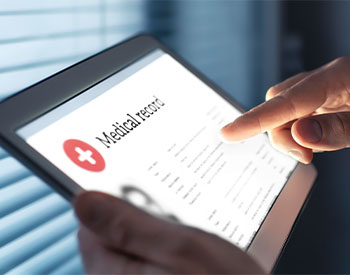
Medical record in electronic form. Digital EMR with patient health care information. Doctor using tablet in hospital or clinic. Personal data in mobile device. Online database for healthcare history.
Health Information Management (Medical Records)
The Health Information Management Department (commonly known as the Medical Records Department) is the central location for the processing and storage of medical information such as lab tests and x-rays, emergency room records, admitting information, and more. HIM serves a vital role in assuring compliance with State and Federal guidelines, which are related to medical information. HIM also serves physicians, hospitals, clinics, and patients with the appropriate tracking, reporting and disseminating of medical information.If you should need copies of medical information from services received at HRMC, please contact or visit the HIM Department. We will need prior notification, along with a properly executed Release of Medical Information form before we can release any medical information, as there are specific Federal guidelines that we are required to follow. In addition, you'll need to provide us with proof of identification (your driver's license or state ID), and after comparing your signature with the one we have on file, we'll release the medical information that you are requesting. For your convenience, you may access HRMC's Authorization for Release of Information from our website.
After receiving the properly executed form/s, copies will be available for your pick up within seven working days. This time frame allows us to conduct for our research and ensures the availability of the requested information.
You may reach Health Information Management by calling 863.902.3095 or email shernandez@hrmc.us. Our fax number is 863-983-2340. Thank you for allowing us to serve you!
Frequently Asked Questions
What is a medical record?It is a record of the information generated during the course of a patient's treatment. It includes a variety of information in a variety of formats (written, electronic, X-ray film, etc.), including personal, financial, social, and medical information. Your medical record serves as a basis for planning your care and treatment, a means of communication for the healthcare professionals contributing to your care, legal documentation describing the care you received, verification of services and treatment covered by your insurance, and basic data for health research and education.
Are medical records confidential?
The information found in medical records is confidential. Patients confide in their physicians because they are assured of this confidentiality and might not share the necessary personal information if this privilege did not exist. Healthcare workers are mandated by law and by professional standards to protect patient confidentiality. There are also state and federal laws to protect information related to specific diagnoses such as psychiatric/psychological, treatment of substance abuse (drugs and alcohol), and AIDS/HIV.
Who owns the medical record?
Your record is the physical property of the hospital. However, the patient controls the release of the information contained in the record.
Who can access my medical record?
In general, you must give permission for anyone, other than a member of your healthcare team, to have access to your medical record. By law, your records may be disclosed without your permission under certain circumstances such as in response to a subpoena or court order, to certain government and regulatory bodies, to someone who holds your power of attorney, to someone you have designated as your healthcare surrogate, to another healthcare provider for continued care, and to your healthcare insurer to obtain reimbursement for your care.
How secure are computerized medical records?
Computer-based medical records are as safe as paper records and are covered by the same laws. There are technical safeguards for the protection of computerized data as well as procedures for identifying and punishing violators.
How long will you keep my medical record?
By Florida law, medical records must be retained for a minimum of eight years. Most records are retained longer.


